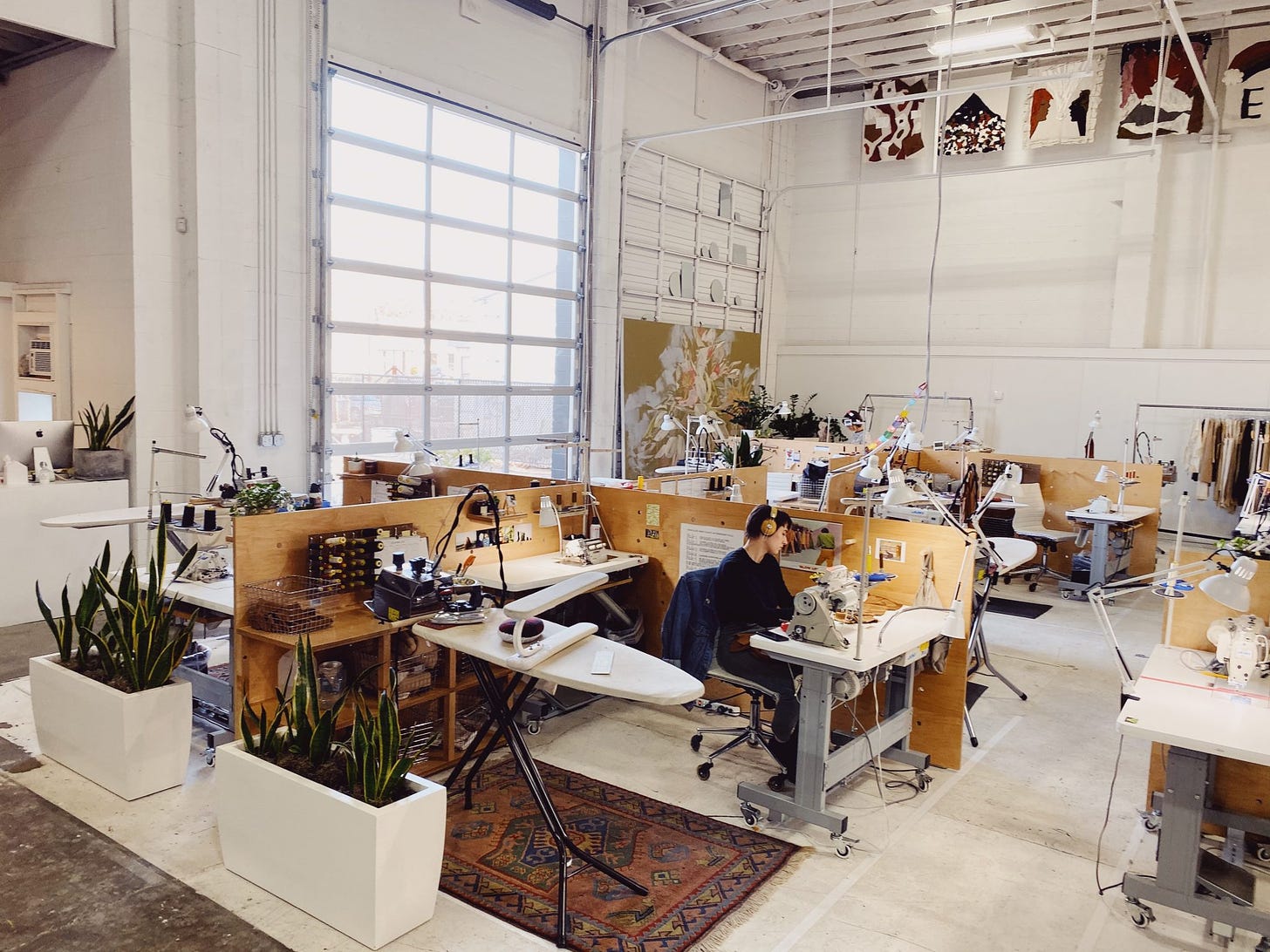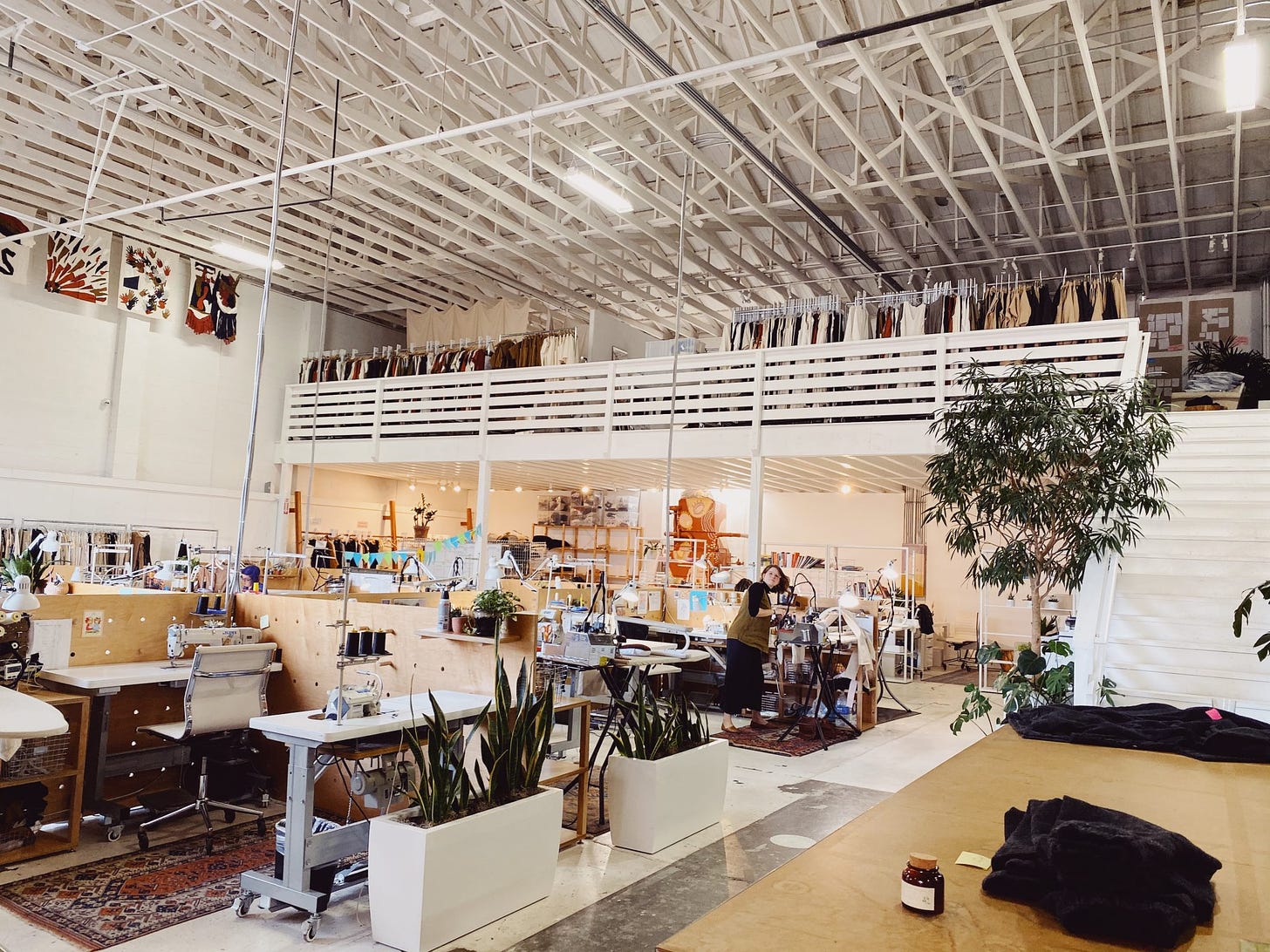ways to "do" ethical fashion that don't cost (as much) money
How do we balance the desire to buy sustainable fashion with financial limitations?
Just a quick reminder that the unflattering chat is open and active! This is an added benefit to all subscribers, who can respond to threads, and paid subscribers get the added bonus of being able to ask the community anything! Need help styling something or recommendations for a niche item? It’s all there.
I looked back in my archives and it appears that I haven’t yet written an article about ethical fashion on Substack, which is hard to believe since it’s something I think about very often and that I know people have questions about. I’m sorry I’ve failed you all until today 😂
Let’s start with some definitions.
“Ethical” fashion refers to practices meant to protect the humans involved in the process of producing clothes, such as paying a living wage, safe working conditions, and protection from toxins created by production.
“Sustainable” fashion refers to practices that attempt to protect the environment, by adopting practices such as using organic thread, offsetting shipping carbon, and recycling garments.
“Slow” fashion means to slow down the entire process of consumption and both ethical and sustainable fashion are ways to implement this (thanks to reader Nikki for helping me clarify this).
The whole thing is very nebulous. Technically, according to these definitions, brands can be sustainable without paying living wages, or they can be ethical without reducing waste, and there are also many brands whose practices could be labeled both ethical and sustainable.

I’ve always used the phrase “ethical fashion” for anything under all three of these umbrellas, because to me, prioritizing workers, the environment, and slowing consumption are all ethical pursuits. In addition, I consider a brand “ethical” if it is working towards one aspect of any of these areas, because no brand is doing it all. Add to all of this that there’s no ethical consumption under capitalism and your eyes are probably glazing over.
That’s exactly why I want to break down the ways that you can practice ethical fashion, without having to spend a lot of money. For the purposes of this article, I’m going to use mainly the term “ethical fashion”.
There are a few ways to practice ethical fashion, regardless of budget (with accompanying disclaimers).
The first, easiest, cheapest way is to reduce consumption by using what you already own. Often, we don’t even know exactly what we have (take an inventory to find out). Rewearing outfits counts. Repair and repurpose what you have to extend its lifespan. Learn how to do small alterations or support a local small business by using a tailor. However, you deserve clothes that fit, and if you don’t own any, this isn’t going to work for you.
One of the most effective things you can do is to buy items that you will wear many times. An oft-quoted study showed that women only wear a clothing item 7 times before discarding it1. In my opinion (some disagree), you can buy clothes ethically even if the clothes aren’t “ethically made” by considering how much you’re going to use and wear something. If you buy something from the Gap and wear it three times a week for three years, it’s a more ethical purchase than something officially ethically made that never gets worn. Again, this isn’t easy. The myth that you can buy timeless items is just wrong. There are periods in our lives when our bodies are changing so quickly that we might not get to more than 7 wears, and sometimes we make mistakes and buy something that doesn’t work out as we had hoped.
Learn to sew. This is the only reliable way to actually get clothes that fit your specific body, but it’s not cheap and it’s not easy.
The approach I use most often is to buy secondhand. Thanks to this country’s enormous consumption of clothing, there won’t be a shortage of secondhand items any time soon. For the majority of straight sized women, almost anything can be found secondhand. Unfortunately, secondhand clothing may not be an option to you if you need a wider range of size options or if you’re unable to physically or mentally comb the aisles.
Buy less, but better. For many people this just isn’t possible, and if that’s you, skip ahead. But for the rest of you, are there other things you’re spending money on that don’t align with your values? Could you slow down impulse purchases and put aside the money you save for something higher quality? Could you not buy multiples of a cheaper item and instead buy just one ethically made item that will ultimately last longer?
Finally, if you have the resources (ethically made garments are inherently more expensive because the brand is spending more money either by paying ethical wages, disposing of toxins properly, or sourcing organic materials), you can purchase items that are ethically made. Of course, discerning which clothing is actually ethically made and to what level is tough, but the Good on You website and app are helpful, as is the B Corp directory. Sushmita’s newsletter
is also a great resource.
Having given all of these ideas, I think it’s really important to call out the perfectionism that arises around these issues. I've often seen women so paralyzed by trying to make the perfect ethical decision that they actually don’t make any purchases at all. Corporations and governments deserve that type of pressure to change their systems, not individual humans trying to get by in these apocalyptic times.
All of this is a spectrum. You’ll buy things you thought you’d love and wear but you don’t. You’ll buy things and then your body will change again.
Do your best.
What has been your experience with ethical fashion?
P.S. I plan to share a few of my favorite ethical fashion brands, in a variety of price ranges, all including sizes up to at least 3X on Thursday for paid subscribers only. Upgrade now so you won’t miss it! I always offer comps for anyone unable to do so, just shoot me an email. If you really want all my good stuff, consider upgrading to the unflattering membership where you’ll receive access to my full spreadsheet of 240 retailers (and always growing) sorted by sizes available, price range, style, and whether they’re ethical or not. Virginia Sole-Smith called it “gold”.
P.P.S. Could you like or share this post? It makes a big difference in its ability to reach new readers. 😘
I couldn’t actually track down said study









It's such a good reminder that actually WEARING my clothes is participating in ethical consumption. Yet another reason to stop "saving" the good stuff!
Dacy, what are your thoughts on clothing rental companies like Rent the Runway to reduce buying clothes generally but especially of items that people are likely to only wear once or a few times? I’ve rented from them before and it scratched that itch to wear new clothes without actually buying any new clothes. I recognize the financial privilege in being able to afford to rent items and that many of the designers on there are not size inclusive, and of course the environmental impact of shipping the clothes (though they at least use reusable bags instead of boxes).